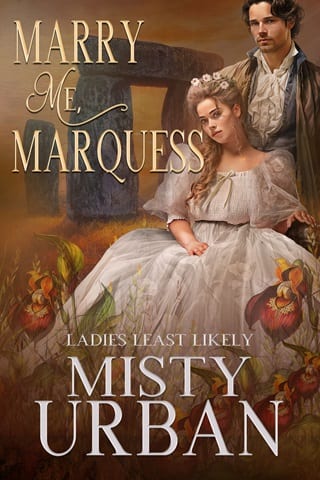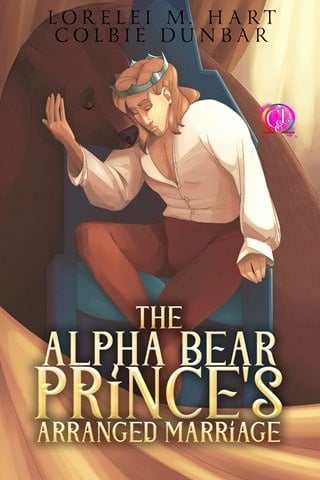Chapter 13
CHAPTER THIRTEEN
S tonehenge captivated Lillian immediately with the magic that sang these great stones into place. The immensity of it was nearly absurd, the tall, hammered stones with their rough shapes jutting into the sky, standing scattered about as if they’d forgotten their purpose long ago. There was a weary, ancient sense to the place, with the fallen monoliths lying like enormous grey seals on the green turf, edges softened by time and weather.
Her parents occupied Leo with introductions to William Cunnington, fellow antiquarian, then busied him looking at this stone and that hole, staring for long lengths of time at humps in the scenery that meant nothing to Lillian. Hester peeled away to wander about. Lillian did the same, taking a seat on a smaller stone that sat apart from the rest, and pulled out her sketchbook and crayon.
A small, bright warmth bloomed high in her chest sometime later when she saw Leo stalking her way, hat swinging in his hand, wonder and satisfaction mingling on his face as he stared about him. He lowered himself to sit on the grass beside her, and the small bright place within her buzzed with contentment, like the bees murmuring in the flowers.
“What are you drawing?” he asked.
“Flowers, at first. I found some lovely specimens of meadow clary.” She turned the page of her sketchbook toward him, realizing that she felt no hesitation in showing him her work. “Isn’t she lovely? Look at the curl of those petals. I wish I had my watercolors to capture that purple. And I adore the fuzzy bits about the stem.”
“That is lovely.” His eyes traced the page, then lifted to her face, and for a moment she had the embarrassing fancy that he was referring to her. Something thumped in her chest. “What are you chewing?”
“A leaf. They’re a touch bitter.” She stripped a small oval leaf from a nearby plant and handed it to him.
Without a qualm he slipped the bit of green into his mouth, then made a face. “Tastes like medicine.”
She grinned. “It is. Meadow sage, as it’s otherwise called, has long been a staple of herbals and apothecary’s stores.”
He glanced at her lap. “And now you are drawing the stones. Or rather,” he leaned forward, “your parents.”
“I imagine tourists have sketched Stonehenge a thousand times. But my parents like to have records of their excavations. Did they tell you what they’ve found?”
“Nothing, yet. I gather your mother is a touch disappointed. Camden, when he excavated back in the time of Elizabeth, reported finding ash and burnt bones. The Duke of Buckingham made an enormous trench a few years later, looking for treasure. I imagine that’s what Cunnington is hoping to find. There, where they’re digging, is the base where that trilithon recently fell. Cunnington wanted to see if one of the legends is correct, and the stones mark burial places of the honored dead.”
“And does it?”
“Seeing the place, I’m now inclined to believe Stukeley’s claim that the entire ring is an astrological map of some kind. A way to chart the seasons and a ritual temple for the Druids. Inigo Jones said it was built by the Romans, like their roads and aqueducts and amphitheaters, but I think it is even older, and almost certainly holds some ceremonial value.”
“How can you tell?”
He leaned on one elbow, the lord at his ease, his long, powerful body stretched out on the grass. With the low slopes of the plains and the cloud-stuffed sky behind him, the great stones of the henge at his feet, he seemed some ancient god come to life.
“Those mounds in the distance, there, and there? Tumuli. Burial chambers, if I had to guess. Aubrey speculated that the pits he found were for cremation burials—you can see the depressions outside the circle. But if there are no burials inside the circle, that suggests it was used for something else. See the ditch that surrounds the whole? I suppose a boundary of some kind.”
She followed his pointing finger, squinting to see beyond. “What’s over there—another barrow?”
“No, that is the cursus, a sort of long, smooth road. Stukeley thought the Romans might have built it to race their chariots. But it could be older, and have some other significance. A line of sight, a gathering place, an ancient trackway—I’d love to know.”
Lillian sat back. “I don’t see how we ever can.”
“But we can learn as much as possible about a place, and form theories. That is the beauty. See that path, where it looks like the stones make a gate? Stukeley called that the Avenue. Possibly it runs down to the Avon, which the builders could have used to ferry the stones here from somewhere else. These sarsens are sandstone, and Salisbury Plain is chalk downs. Cunnington tells me there’s another chalk horse over by Westbury, incidentally.”
“He told me the Avebury circle is larger in size, but much less is left standing. The Christian monks of the Dark Ages didn’t like these pagan monuments and encouraged farmers to knock them down and cart away the stone. Perhaps that’s what happened to some of the missing stones here.”
“Or they just sank back into the earth, like that old giant wishes to do.” Leo pointed to the weathered stone, taller than the others but listing to one side, as if weary of being the greatest and standing alone. “Or it’s possible the circle was never finished. Ran out of stone, or the king ran out of money, or had to use his money to fight a war.”
His enthusiasm lit a warm spark inside her. So did the easy way he conversed with her, as if he considered her an intellectual equal, the way her father regarded her mother.
“Perhaps it wasn’t for religious purposes at all, but for entertainment,” Lillian suggested. “A great dancing floor. Or an open-air theatre, like that of the ancient Greeks.”
“Too tame,” Leo teased. “You must be bloody minded, like these ancients. See that fallen stone, there? Jones called that the Altar Stone. And that other one, slightly reddish—the Slaughter Stone, where the victims were decapitated and then buried.”
“You are bloody minded. And that one, standing apart, I suppose is where prisoners were chained.”
“That is the Heel Stone, and if you stand there and watch, on the eve of the winter solstice, the sun will set exactly between those two sarsens.” Leo leaned against her as he pointed, and Lillian’s heart rapped against her ribs like a startled hare.
“Perhaps your smith’s cave at Wayland will prove to be an astrological map as well,” Lillian said. She must remind herself he was leaving; she must remember he was not hers. “Simply think of what you might discover.”
“Enough to impress the Society of Antiquaries, I hope.” He settled back on his elbow, at his ease with her. “I’m glad for the chance to talk with Cunnington—he’s long been interested in these barrows. He’s got a digging technique he wants to try, basically boring a hole straight down, and seeing what the layers reveal.”
“It sounds exciting. A peek into the distant past.”
He rolled the leaf along his lips, lost in thought. “You were right that we are alike in that. Both driven by curiosity to discover, and the wish to share our knowledge with others.”
She met his gaze, steady, thoughtful, and that bright spot made large loops through her chest cavity, like a star in orbit. “Thank you for that,” she said softly.
“For what?”
“For believing that I can add something. For believing in me.” She smiled. “For not helping me publish my florilegium simply because a gentleman’s oath compelled you.”
Every piece of attire was in its proper place, yet his demeanor was so loose, relaxed, it lulled her into forgetting he was dangerous. “Your parents said you have never thought of marriage. Why not?”
She watched her parents moving about within the shadow of the immense stones. To the north, a shepherd boy grazed his sheep on the long grass, looking on curiously but without much concern.
“A dearth of suitors, first. Second, I have specific requirements. I think you have gathered that my parents have an unusual relationship.”
He nodded. “She travels and works with him, rather than staying at home to tend the cookpot and her sewing.”
Lillian snorted. “My mother can barely sew a button, but she can tell at a glance if a piece of bone she dug up was used as a digging implement, a brooch, or some other tool. My father doesn’t permit her to come along out of affection. He relies on her.”
“And?” He drew the leaf out of his mouth, tossing it aside, and Lillian told herself to stop staring at his lips, his white teeth.
She propped an elbow on her sketchbook and watched her parents as they stood side by side at the edge of a hole, supervising the diggers and addressing one another with an animation that told her they were having a productive disagreement about something. She hadn’t put this feeling into so many words before, but here on this broad plain, with its enduring stones, she saw clearly what she wanted for her future.
“I don’t know what man would want to tramp over the countryside with me and wait patiently while I sit and draw flowers. Moreover, I don’t expect many men would share my father’s feelings and regard their wife as a partner in their endeavors. But I don’t want to be anything less than that.”
“Surely,” Leo said softly, “the man exists. You need only find him.”
She sat back and fiddled with a few lines of her sketch. “I have cousins up north, from my mother’s family,” she finally said. “My mother has always spoken as if I’ll end up wedding one of them eventually. My father will inherit the baronetcy after my Uncle Lloyd passes, may that day be far from us, and he will in turn want someone to pass it to. He hopes his legacy will be his antiquarian work, but at the same time, he doesn’t want to be the end of the honors that his forefathers earned for the family. And Hester is not likely to marry and have children. So…”
“So it falls to you to continue the line and the title.” A bitter flavor edged Leo’s tone, like the bite of the leaf.
She met his gaze. “I imagine you know what that feels like.”
His expression was vulnerable, soft, his eyes a well she could fall into and be lost in. He nodded slowly. “I would rather a title I earned myself. A modest little knighthood awarded for my discoveries, for contributions to the realm. Not an estate bought at the price of my cousin’s life. And thank you for that,” he added.
“For what?”
“For seeing me as more than the marquess’s heir. It’s all anyone has seen of me lately. Even—no, especially my own mother. I think that’s one reason I’ve been so determined to arrange my own excavation. I want to be known as Leonidas Westrop, antiquarian. Not Leonidas Westrop, heir presumptive.”
“Leonidas Westrop, benefactor of botanical publications,” she said, rolling the name around on her tongue, savoring its full, spicy flavor as much as she savored the sight of him with his brocade coat, kerseymere pantaloons, and frank, open gaze. “You, as your own self, are very hard to overlook.”
“I am very glad you think so.”
She might have leaned toward him; he might have learned toward her. Or perhaps they met in the middle, for his face neared, close enough that she saw the stubble already sprouting along his jaw, the individual lashes that ringed his eyes, the crease in his lower lip. Then those lips touched hers, and she surrendered at once to the sensation, both familiar and new. A sweetness she recognized as belonging to him, laced with the sharp bite of the herb, the scent of meadow grass and chicory in her nostrils, and the buzzing of an entire beehive filling her ears.
He licked into her mouth, drawing her tongue into the dance she now knew, and a thick, warm syrup poured through her veins. She lifted a hand to his jaw to keep herself from toppling over. Her forehead might hinge open and all sense float away with the passing clouds. Leo kissing her was all she wanted in the world, all she ever wanted, now and always.
His hand settled on her side, above her waist, and the syrup bubbled and simmered. She met his kiss with a new urgency. She wanted this to continue, her mouth on his, but she also wanted something more. That thick, flowing stream wasn’t filling her veins; it was hollowing her out, making her ache for something.
“Lillian!”
Her mother’s bellow cut through the fog in her head. A sharp edge to Alida’s tone made Lillian wonder how long she’d been calling. “Time to recollect yourself, dear. Come hither, we need you more than Mr. Westrop does.”
Lillian opened her eyes and stared at Leo. It was a touch gratifying to realize he looked almost as bemused as she felt.
“I rather think my need is more urgent,” he murmured.
Heat shot through her cheeks, and she slapped hands to her face in a feeble attempt to hide the blush. “I am kissing you in front of my parents , and William Cunnington, and that shepherd boy, and everybody .”
“Kissing me very thoroughly.” He squeezed her side, fingers pressing into her soft flesh, as if he couldn’t help himself. “But you might say you are kissing your future husband, if anyone should scold.”
Her mother’s tone sounded more amused than disapproving as Lillian hastened over, sketchbook and crayon clutched in her hands. “We can all see you, you know,” Alida chided, without taking her eyes from the pit where one of the Parker brothers scraped at something with the side of his trowel.
“I forgot myself. I’m so sorry.”
Alida glanced back at Leo, who sat with hands on his knees as if he had nothing to do but watch Stonehenge gracefully weather and age. Her eyes narrowed. “Be on your guard, my girl,” her mother murmured. “That man won’t rest until he has you.”
“Until he has me—how do you mean?”
“In the biblical sense. Carnal knowledge.” Her mother slid Lillian a sidewise look.
The burn in her face intensified. “That is not where our—liaison is going,” Lillian said.
“That is exactly where it is going, if you permit it.” Alida did not seem terribly shocked or fretful. “Only remember, my dear, it is one thing in St. Athan for a housemaid to have a belly on her when she marries the butcher’s boy. It is quite another for a niece of the Baronet Gileston to have a belly when she marries the nephew of a marquess.”
“I won’t be so foolish, Mother.”
“Why wouldn’t you be, when many a one among us has been as foolish before? A man like that is a heady spell, my darling. Keep your wits about you.”
Lillian’s father came to stand beside them. “What is it, John?” he asked the digger.
“Coin, I believe, sir.” The young man kneeling in the pit held up his trowel. “Shall I pry it out?”
“Have Lil sketch it first. How many hands deep?”
The young man placed his palm horizontal to the side of the pit and measured downwards. “Four hands, sir.”
“Good, good. Lil, my gel, get this in situ, will you, with the measurements in it. Can’t tell you how much we’ve missed your sharp eye.”
“So that is that why you sent for me.” Lillian sat on a fallen stone, flipped to a fresh page in her sketchbook, and with a few strokes sketched the square of the pit. She’d forgotten how much she loved all this: the lazy hours of waiting and scraping the dirt, then the sudden, sharp thrill of a find. Those moments when her parents needed and wanted her.
Almost as dizzying as Leo wanting her.
“That, and my sister-in-law was eating herself into a fury over your behavior. Making an exhibition of yourself, kissing in public places, debasing the family, et cetera.”
“How would I be debasing the family by putting a shackle on the heir to a marquess?” Lillian held out her crayon and closed one eye, measuring the depth of the pit against her utensil, then applied those dimensions to her picture. “I would think she’d applaud me for setting my cap at him.”
“Very precise measurements,” a new voice said behind Lillian’s shoulder. “Approve their methods, must say. Why I wanted them.”
She craned her neck to see William Cunnington had joined them. In defiance of current fashion he wore a small wig, a waistcoat with a number of fobs and trinkets dangling on a chain, and sturdy breeches. He beamed at Lillian. “Drawings and everything.”
Leo stood beside Cunnington. She hadn’t realized the men were approaching.
She was quite sure, from the sudden, alert stillness in Leo’s mien, that he had heard what she said about putting the shackle on the heir to a marquess.
She focused on her sketch, taking care to be fast but accurate. Her sketches were not only useful records for later, when her parents tried to reconstruct the setting, but might very well be included in their eventual publication.
He could guess she was being flippant. That she was using her aunt’s language, not her own. He must know she hadn’t meant it.
“Has anyone an eye on Hex?” she asked, self-conscious as everyone watched her work, including Leo.
“She’s over petting the sheep,” Leo reported. “I’ll wager that will be the highlight of her day.”
Lillian added a quick note to her sketch, marking the dimensions and the depth of the find. “Done.”
With great eagerness, and great caution, her father pried the small object out of the wall of the pit. He dusted off the dirt, then gently blew. He lifted his face, meeting his wife’s bright gaze as if everything else around them had fallen away.
“A coin,” he said, handing it to her.
“Peter,” Alida breathed. Lillian peered into her mother’s hand as she examined the object, scrubbing away dirt and chalk embedded around the printing. “It’s gold. And this is a Roman stamp, isn’t it?”
“Gold.” Peter nearly bumped his head to Lillian’s as he strove for a look. “A solidus?”
“Lil. We need your eyes.” Alida handed the treasure to Lillian.
Her palm tingled. She was holding something centuries old. The markings were surprisingly sharp and clear; the coin might have been dropped, or buried, while relatively new. And it was whole, not clipped, as one often saw, especially with later coins.
“D N MAGMA,” she read around the head in profile with its diadem and noble nose. “XIMVS PF AVG. I don’t know what that means.”
“Some of it will be titles,” her mother murmured, “and some will say where it was minted.”
“Magnus Maximus?” Leo offered.
“By Jove.” Peter took the coin and peered at it again, dazzled. “I’ll bet that’s it. And AVG might mean Augusta, which is what they called London for a time. What a find!”
“Magnus Maximus, the usurper?” Lillian frowned.
“Macsen Wledig to the Welsh, the soldier raised to emperor by the British troops,” her father said. He looked at Leo. “He went on to challenge the sitting emperor—who was it?”
“Gratian was the one he had killed. But Valentinian, I believe, was the one who resisted. Went and recruited the eastern emperor—Theodosius, wasn’t it?”
“I thought Theodosius was the count who defended the Saxon Shore,” Lillian said.
Leo gave her a mock frown. “You told me you had read your Brut. ”
“All the names blur together after a while,” she admitted.
“Heretic,” Leo said. “You’d never confuse plants in that manner, no matter how similarly named.”
“True,” she agreed. She held Leo’s gaze, both of them smiling foolishly at one another, caught up in the same heady thrill—the discovery, its import, and something else—being able to share the find with another, someone who understood.
She grew aware that, instead of conferring about the coin, her parents, and William Cunnington, and the Parker brothers, had all paused to watch her exchange with Leo.
“Aren’t you two precious. Draw an impression for us, Lil.” Alida pressed the coin back into Lillian’s hand. “Just as you see it now. We’ll clean it up later and write some letters of consultation.”
“Of course, Mama.” Lillian folded her legs beneath her and set to sketching the front, then obverse side of the coin.
“That is quite well-preserved. Do you suppose some Roman tourist dropped it?” Leo squatted beside her, watching her work, and that steady, bright hum within her carried on. The thrill of discovery lit his frame, as if he vibrated on the same frequency she did.
“Perhaps it fell out of his pocket while he was witnessing an execution.”
“Or perhaps he paid the executioner for a nice, swift, clean blow.”
“In that case we might expect to find his skull a bit further down. Please warn the Parkers.”
“Would that upset you? Finding human remains.”
She gave him a level look. “I prefer to find coins, or pottery, or tools, but again, you forget I was raised by these two. We’ve run across a human bone or ten.”
“You enjoy this,” he remarked.
She grinned back at him, catching his joy. “And so do you.”
“Finely done, Lil.” Alida appeared beside them, peering over Lillian’s shoulder as the coin emerged, Maximus with his cuirassed bust and sharp, sloping nose. His profile reminded her a bit of Leo’s with the strong brow and jaw.
“Who have you retained to make your drawings, Mr. Westrop?” Alida asked.
“Oh. Er. I hadn’t thought to procure an artist.”
Alida turned to him, her eyes widening. “But you must. It is part of proper methods and oversight. You must sketch where you found it in the setting, so you might identify the deposit in relation to the other artifacts. And then you will want a clear rendering for publication, later.”
Leo blinked. “I—I didn’t know. Where should I look?”
“Perhaps you might find a local near Uffington,” Alida said. “We’ve relied on Lillian for years.”
Lillian cleared her throat as an absurd thought leapt to mind. Wiser to push it away, but Leo was giving her that look again, the look that said, Help me . The look that said he needed her.
She knew that drawing close to him would be lowering her heart over a precipice, and she’d never get it back. She knew that this sense of companionship—of belonging, even—was an illusion conjured out of green spaces and seductive ruins and the freedom of open air.
She threw herself at the fence anyway, hoping the fall, when it came, wouldn’t kill her.
“I suppose I might go with him,” Lillian said.
 Fullepub
Fullepub 



